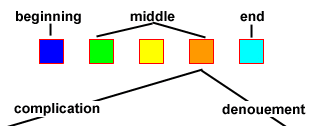
2) wholeness and completeness
![]()

The concept of the wholeness or completeness of a play is so essential to Aristotle that he bothers to elaborate a detailed definition of the term "whole." The exposition of what constitutes the beginning, middle, and end of a whole process may appear to be an intentionally humorous tautology, however, it reveals a vision of Greek tragedy that is not commonly held today. In his definition of the beginning, for example, Aristotle treats the opening moments of the drama as if they serve as an introduction to a new world particular to that drama. Such an introduction presupposes no knowledge of prior events, even though such events may be pivotal to the plot. If something essential existed before the beginning, it has to be brought to the audience's consciousness at the appropriate moment in the exposition. In this manner, a spectator who is not familiar with the Homeric myths, would enjoy Oedipus Rex, even if he or she did not know the story of the death of Laius. Similarly, the story of the sacrifice of Iphegenia is contained within the first choral odes of the Agamemnon, preparing its audience for the reverences to it later in the play. In order to preserve the "wholeness and completeness" of a tragedy, Aristotle urges dramatists to include any prior happenings into the structure of events, even if only through exposition.
The reverse is true for the conclusion of a drama. While The Bacchae ends during the moments or hours following the death of Pentheus, we are told that Cadmus and Harmonia will travel with the barbarian hordes in the form of snakes for fifty generations until their subsequent return to Thebes. This pronouncement concludes the horrific events of the play with the promise of an eventual redemption at the end of a long period of suffering, and we need witness no further events to be assured that the stain of the events of the play will eventually be washed away. At this point, the process of the play is complete, and nothing more will follow.
Later in the Poetics, after his discussion of the elements of a complex plot, Aristotle also talks of a two-part division of the events into complication and denouement. This division of the plot hinges on the moment the tragic hero experiences a sudden reversal of fortune (peripeteia). Effectively, Aristotle lumps the exposition and the development together into what he calls the complication.
![]()

 |
 |
2b) story and plot
Aristotle makes a distinction between story of a tragedy and its plot. The story may include events that take place before the beginning of the play or after its end. Since the audience must experience a play as a complete whole, these events are relevant only to the extent that they are useful in the play itself. Generally, previous events are loaded into the play in the exposition, most likely in a choral ode. What the audience experiences when the play begins is a new world that is often out of balance, or soon to be out of balance. In the process of the play, the world may return to balance, or a new sense of balance may be defined. In either case, the dramatist presupposes no knowledge of the world of the drama in advance, and if there is need to know what will happen after the play concludes. That information will be given before the drama ends.

Aristotle's statement that the playwright must, "at all costs keep to the received legends" underlines his contention that the art of the dramatist is apparent in the ordering of the events, not in fabricating the stories from which those events are drawn. "The poet [maker] should be a maker of plots." (τὸν ποιητὴν μᾶλλον τῶν μύθων εἶναι - 51b28) This notion stands in marked contrast to the contemporary value placed on invention. The ancient playwright's job was not to invent a brand new story, but to gather received myths, mostly from the Homeric epics, select events to dramatize from those myths, and arrange them in a sequence that provides the most dramatic impact. As a result of the wide acceptance of this concept of the role of the dramatist, we may have a variety of ancient Greek tragedies that portray a single Homeric myth (the house of Atreus, for example.), but with differing plots.